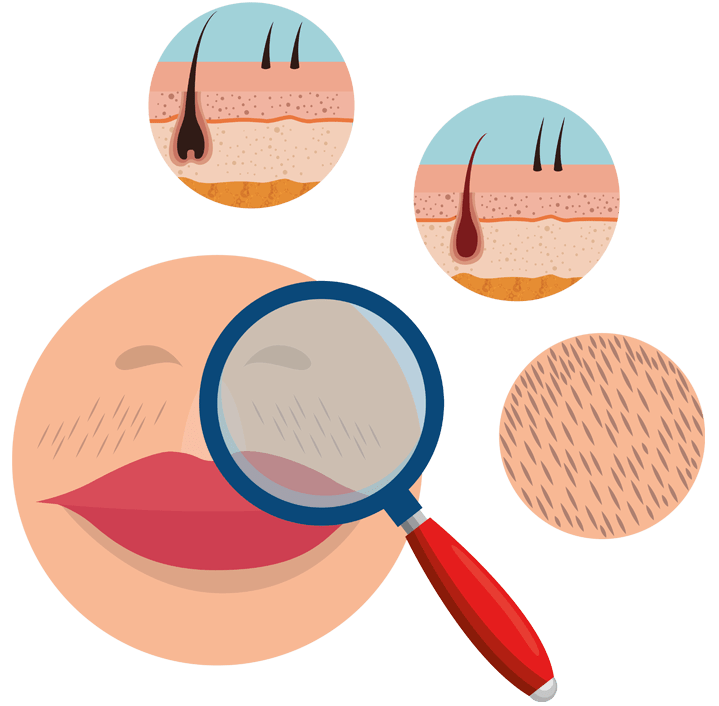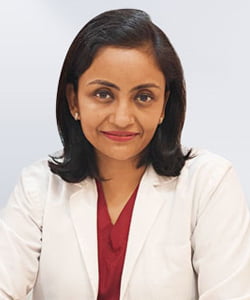Do you know there is a link between the growth of unwanted dark thick hair in the female body (hirsutism) and PCOS?
What is PCOS?
PCOS, short for Polycystic Ovarian Syndrome, is a very common hormonal condition, in which the ovaries start to produce an excess of andro-gens- a class of hormones including testosterone responsible for masculine characteristics. It is an ailment affecting 10-15% of women of childbearing age. PCOS-affected women experience various symptoms, including abnormal periods, acne, infertility, hair loss or thinning on the head, weight gain (especially around the belly), and hirsutism. They have ovaries of larger than normal size containing multiple cysts and are fluid-filled sacs, the juvenile ovarian follicles that could not mature and ovulate.
What is Hirsutism?
Hirsutism is one of the most distressing and visible symptoms of PCOS, impacting about 70-80% of women with PCOS. This condition is characterized by the excessive, unwanted growth of facial and body hair on the female body. It can be seen as dark, coarse hair growing on the face, chest, back, upper arms, abdomen, or upper legs. Hirsutism is very common, and thankfully, medical management and treatment offered at Harleys Cosmetic & Women Clinic, best gynecology clinic in Mumbai, can improve its appearance in women with PCOS. However, it is vital not to delay its treatment as it may lead to long-lasting health consequences.
Overview of Normal Hair Growth
To better understand hirsutism, it is important to be aware of the normal hair growth process. Each hair comes from a hair follicle that lies deep beneath the skin’s surface. As long as these hair follicles are not destroyed, the part of the hair that grows above the superficial skin- the hair shaft continues to grow even if they are plucked or removed.
Every human has their body and faces covered with hair, except the soles of their feet and the palm of their hands. Males have more hair on certain body parts and face than females because they have more andro-gen hormones that play a role in male characteristics.
However, the hair thickness or density differs by ethnic origin. If the reason behind excess hair growth is an ethnic discrepancy or heredity instead of hormonal imbalance, the unwanted hair in women is then usually noted on the hands, legs, and feet. But, if there is hirsutism in females, typically the face, belly, upper lips, inner thighs, chest, and back show excessive hair growth.
Adults have two kinds of hair: Vellus and terminal. Vellus hair is fine, soft, usually short, and generally lighter and covers the face, chest, and back in most women. Terminal hair is dark, coarse, long, and sometimes curly. It grows on the armpit, scalp, and pubic areas of women. The lower arms and legs of women have a mixture of both types of hair.
Hair growth takes place in cycles, each being divided into 3-4 phases: anagen (growth), catagen (transition), and telogen (rest). At the end of the telogen phase, the hair sheds (exogen stage). Hormonal fluctuations, like during pregnancy or the use of birth control pills, may synchronize the hair growth and make them appear to grow and shed more excessively than usual. However, within 6-12 months, the hair growth pattern gets back to normal.
If one is experiencing these issues, one can get the best treatment for hirsutism in Mumbai with Dr. Shilpa Bansal Agrawal, an expert gynecologist and PCOS treatment expert in India.
How PCOS affects hair growth in women?
PCOS is linked to excess facial or body hair, usually resulting from the excessive andro-gens present in the body. Normally, women have lower levels of biologically active andro-gens than men, but there is an increase in andro-gens production by the adrenal gland and ovaries in women affected by PCOS.
If the hair follicles are hormone-sensitive, excess andro-gens may cause some vellus hair to turn into terminal hair, which appears dark and coarse, growing faster and thicker. The andro-gen-sensitive sites of hair growth include:

Causes of Hirsutism in PCOS
Identifying Hirsutism
To help diagnose and treat hirsutism, a gynecologist in Mumbai, Dr. Shilpa Bansal Agrawal, has the required expertise to provide help to people with hirsutism.
If one is diagnosed with hirsutism, the physician may recommend blood tests, special X-rays, an ultrasound, and hormone tests to evaluate the functioning of one’s ovaries and adrenal glands.
Treatment Options Available to Treat Hirsutism in PCOS Patients
The best approach to reverse the hirsutism condition is to resolve the hormonal imbalance: i.e., lower androgen production. However, women who are in the throes of hirsutism often require prompt solutions to minimize the effects of hirsutism. In such cases, the standard hair removal methods such as waxing, threading, plucking, depilatories, bleaching, as well as prescription eflornithine hydrochloride cream can help temporarily remove undesirable extra hair, and electrolysis and laser hair removal can help get rid of the excessive hair growth for long-term. These are all aesthetic treatments for hirsutism in PCOS patients. But, they would not prevent hair growth, which is the main concern in women affected with PCOS.
Among all these cosmetic services to remove unwanted hair, laser hair removal is most preferred by women as it offers long-term hair reduction (maybe a lifetime, smooth, hairless skin) even on sensitive areas of the body. In laser hair removal, a laser expert directs a concentrated beam of laser light to an area having hairy skin. The laser light reaches the base of hair- the hair follicle where melanin of the hair is present. It generates heat which gets absorbed by this melanin and thermally destroys the hair follicle. The laser treatment causes miniaturization of the hair, meaning the dark and thick hair becomes finer and thinner. The actively growing hair eventually falls out and may not grow back again due to damage to hair follicles.
Electrolysis is another permanent hair removal technique, but it is not practical for large body areas. During this method, a very fine needle is inserted into the targeted hair follicle. A mild electric current is passed to destroy the hair follicle’s ability to produce hair.
Other than treating the symptom of hirsutism, certain medications are prescribed by doctors, which works on reducing androgen production and thereby correcting hormonal imbalance that causes excessive hair growth. Currently, the medically-approved medications to curb androgen levels and treat hirsutism in PCOS patients include:

Harleys Cosmetic and Womens Clinic
101-102, Jyoti Tower, DN Nagar,
Next to Nav Chaitanya, off Link Road,
Andheri West, Mumbai - 400053. Locate us
Request An Appointment
